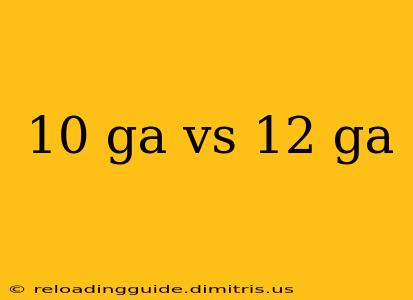Choosing between a 10 gauge and a 12 gauge shotgun is a decision that hinges on several factors, primarily the intended use and the shooter's physical capabilities. While both are powerful shotguns capable of taking down large game, they differ significantly in recoil, weight, and overall handling. This in-depth comparison will help you determine which gauge is the right fit for your needs.
Understanding Gauge: A Quick Primer
Before diving into the specifics, let's clarify what "gauge" means. Gauge refers to the diameter of the shotgun barrel. The lower the gauge number, the larger the diameter of the barrel. Therefore, a 10 gauge shotgun has a larger bore than a 12 gauge. This larger bore allows for larger shot charges, leading to greater power.
10 Gauge: The Heavyweight Champion
The 10 gauge shotgun is renowned for its immense power. It's a formidable weapon, particularly effective for hunting large game like elk, bear, and moose at longer ranges. The sheer stopping power offered by the larger shot charge makes it a preferred choice for hunters in challenging conditions.
Advantages of 10 Gauge:
- Exceptional power: The 10 gauge delivers significantly more energy to the target than a 12 gauge, resulting in greater stopping power.
- Longer effective range: Its superior power translates to a longer effective range, beneficial in open areas or when hunting larger animals at a distance.
- Heavy shot charges: Able to handle heavier payloads of shot, making it ideal for large game hunting.
Disadvantages of 10 Gauge:
- Extreme recoil: The substantial recoil is a significant drawback, making it challenging for many shooters to handle, especially during extended shooting sessions. It can cause significant shoulder bruising and fatigue.
- Weight: 10 gauge shotguns are considerably heavier, making them cumbersome to carry for long periods.
- Limited ammunition availability: Ammunition for 10 gauge shotguns is generally less widely available and often more expensive than 12 gauge ammunition.
- Cost: 10 gauge shotguns themselves are often more expensive than their 12 gauge counterparts.
12 Gauge: The Versatile Workhorse
The 12 gauge is the most popular shotgun gauge worldwide, and for good reason. It strikes a near-perfect balance between power, recoil, and versatility. Suitable for a wide range of applications, from hunting waterfowl to home defense, the 12 gauge is a highly adaptable firearm.
Advantages of 12 Gauge:
- Manageable recoil: While still powerful, the recoil of a 12 gauge is significantly less than a 10 gauge, making it easier to shoot and handle for a wider range of shooters.
- Wide ammunition availability: 12 gauge ammunition is readily available everywhere, in a wide variety of loads and shot types.
- Lightweight options: 12 gauge shotguns are available in a range of weights, from lightweight sporting models to heavier, more robust hunting shotguns.
- Versatility: Suitable for various applications, including hunting various game birds and animals, sport shooting, and home defense.
- Cost-effective: Generally less expensive than 10 gauge shotguns and ammunition.
Disadvantages of 12 Gauge:
- Less power than 10 gauge: While powerful, it lacks the sheer stopping power of a 10 gauge, making it less ideal for extremely large game at long ranges.
The Verdict: Which Gauge is Right for You?
The "better" gauge ultimately depends on your individual needs and shooting experience.
-
Choose a 10 gauge if: You need maximum stopping power for hunting exceptionally large and dangerous game, and you are physically capable of handling the substantial recoil and weight.
-
Choose a 12 gauge if: You prioritize versatility, manageable recoil, ease of use, and readily available ammunition. The 12 gauge is suitable for a broad range of shooting activities and is an excellent choice for most hunters and shooters.
Ultimately, it's crucial to handle both gauges and shoot them (if possible) to determine which feels more comfortable and manageable for you. Consider your physical strength, shooting experience, and the types of game you intend to hunt before making your decision. Consult with experienced shooters or gun professionals for personalized advice.

